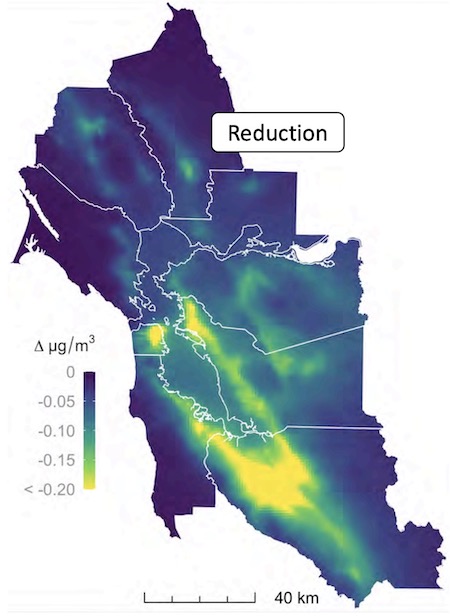NEW: See new blog post with a summary of the vote.
On Wednesday March 15 the Bay Area Air Quality Management District (BAAQMD) will vote on whether to phase out the sale of natural gas heating appliances (space heating and water heating). The proposal requires that gas water heater replacements be electric by 2027 (1) and gas furnace replacements be electric by 2029. The proposal also states that gas furnaces sold starting in 2024 should have “ultra-low” nitrogen oxide (NOx) emissions. (New water heaters and boilers already meet that standard.)
The primary goal of the proposal is to improve air quality by reducing poisonous nitrogen oxides, which will lead to reduced fine particulate matter (e.g., smog) and less ozone. That in turn means better health outcomes: less asthma, less hay fever, fewer days of work missed, and a reduction in some significant illnesses (e.g., respiratory or cardiovascular issues).
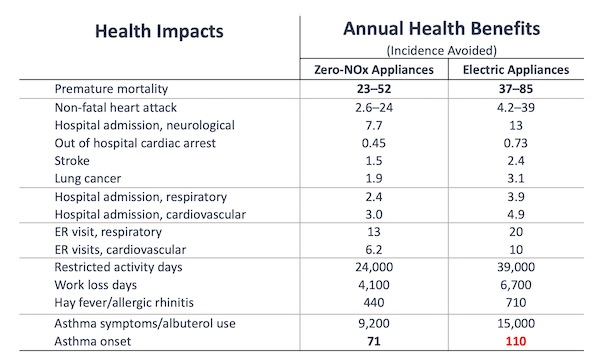
Projected health benefits from eliminating nitrogen oxides (left column) and also reducing fine particulates (right column). Today only electric appliances can reduce both NOx and fine particulates. Source: BAAQMD Presentation
Gas-fired space and water heaters in our buildings represent about 6.1% of NOx emissions in the Bay Area, with other (larger) sources including diesel trucks and construction equipment. Wildfires also generate enormous amounts of particulate matter. So removing gas heat from buildings is a significant change but hardly the only change needed to improve our air quality.
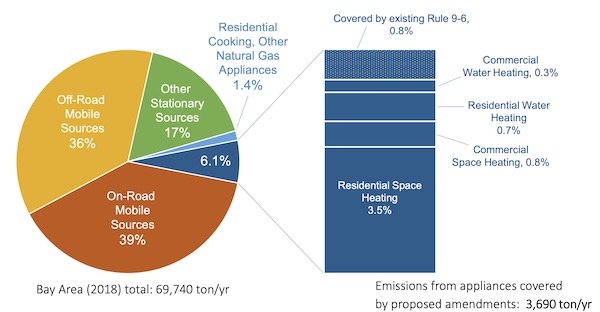
NOx emissions covered by this proposal represent 6.1% of all NOx emissions in the Bay Area. Source: BAAQMD Presentation
BAAQMD values the benefits in the hundreds of millions of dollars per year. About 60% of the benefits come from reducing NOx emissions and another 40% from reducing fine particulate matter, which currently is possible only with electric appliances. There will also be reductions in greenhouse gas emissions, which are not included in this valuation.

The benefits of reducing nitrogen oxides and fine particulates are worth hundreds of millions of dollars according to the BAAQMD analysis. Source: BAAQMD Presentation
But this change will not be free. The BAAQMD report acknowledges that currently it costs more to install efficient electric appliances, in their estimate $2900 more for space heating and $850 more for water heating, plus an additional $1000 - $2500 if a panel upgrade is needed.
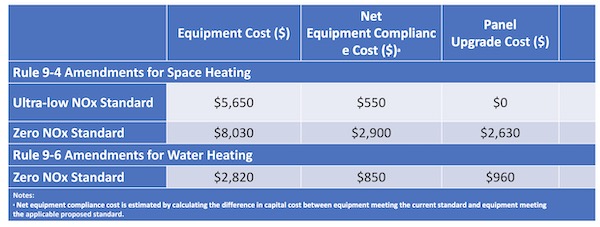
Efficient electric appliances cost more to purchase and install. Source: BAAQMD Presentation
They address this in two ways. First, they note that projected benefits will greatly exceed the costs.
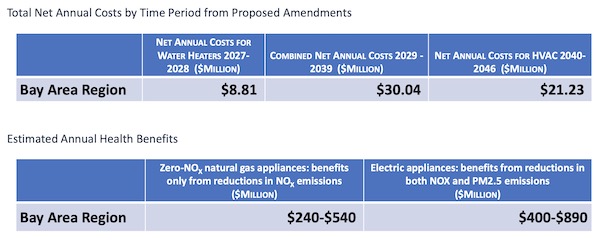
The costs of the proposal are dwarfed by the benefits, as estimated by BAAQMD. Source: BAAQMD Presentation
Second, this ruling is intended to accelerate the market for heat pumps, which should reduce cost, improve availability, and grow the workforce. Critically, BAAQMD proposes to evaluate technology and cost two years prior to the implementation date with a focus to “ensure equitable outcomes”. The date can be moved back if cost and/or technology look problematic from that perspective.
Cost and equity are not the only potential issues. The draft environmental impact report accompanying the proposal raises the issue of potential noise from heat pumps, as well as citing potential environmental impacts from new power sources. Commenters raised concerns about grid reliability in addition to cost. KCBS Radio recently hosted a good discussion about this proposal with UC Berkeley Professor of Economic Policy Lucas Davis and Executive Director of the Building Decarbonization Coalition Panama Bartholomy. Davis cited high electric rates as a disincentive to electrifying, while Bartholomy expressed concern about the time it takes to make this switch if an appliance breaks. Bartholomy wants to get contractors on board and motivated, with easier to install equipment. Davis wants to see fairer and lower electric rates. They had different opinions about the BAAQMD proposal, with Bartholomy more optimistic that it will bring necessary momentum to the changes we need to see, and Davis concerned that it is premature and can result in counter-productive behaviors such as repairing rather than replacing old polluting furnaces.
I am curious what you all think of this proposal. I am torn. It is clear that we need to switch our homes away from gas. And I believe that proposals like this are essential to develop the local heat pump market, advance technology, build the work force, and reduce costs. But even just contemplating this change is a painful prospect for many. My preference would be for us to impose the low-NOx requirements for gas furnaces, which is simpler and lower cost, and tackle lower-hanging fruit when it comes to NOx and greenhouse gas emissions (e.g., wildfire reduction), while at the same time pushing hard on lower electric rates and contractor incentives for the next few years to make the switch easier. I also look forward to the results of Palo Alto’s 2023 heat pump water heater pilot, in particular its findings on actual costs to install these appliances and what can be done to simplify, speed up, and lower the price of electrifying water heating.
I will update this post some time on Wednesday or Thursday with notes on the discussion and vote.
Update 12:40pm March 15
Staff presented and about 2.5 hours of public comment followed. The vast majority of the ~200 public comments were in favor of the proposal. There were some large organizations (Sierra Club, NRDC, Earthjustice) speaking in favor. A lot of physicians spoke up in favor. A number of students spoke, many of whom have relatives with asthma or have it themselves. And many advocates from various smaller environmental and/or climate organizations. Multiple parents and grandparents concerned about their kids' future spoke up as well.
A few people spoke up against the proposal, including representatives from realtors and also HVAC organizations, though not all realtors and HVAC people were against this. There was concern from apartment building owners about cost and disruption to tenants. Some homeowners spoke up about costs, about lack of space for heat pumps, and about reliability of electricity, including some whose power is out right now due to rain yesterday.
Discussion is now beginning. Some key questions are how much will the market move as a result of this? Will the organization be successful in addressing equity issues? Is the time for this just right, given all of the incentives available? Or is it premature and possibly over-optimistic about how the market will evolve? Will the built-in safeguards for costs and equity be effective?
Update 2:00pm March 15
This proposal will be approved, though discussion is still underway. All directors speaking are enthusiastic about it. There are concerns, for example about PG&E's ability to support this effort. But all feel it is important to get this effort started, let the market do its magic to reduce costs, and support the Implementation Working Group and two-year updates so there is a good implementation. I will have a more comprehensive update later.
Update 3:00pm March 15
After six hours the board voted to approve the phase out of sales of gas heaters, with a condition that outcomes be equitable, particularly for disadvantaged households. 20 board members voted yes, 3 were absent, and Ray Mueller of San Mateo County abstained. Mueller's abstention was impassioned and informed.
I will summarize the discussion later. For now, I think the best way to think about this ruling is that it gets the ball rolling on removing gas from buildings, a difficult effort that will take 20+ years once it goes into effect due to the lifetime of these gas appliances. It won't go fully into effect until 2031.
I agree with many of Mueller's concerns. I also think that at the end of the day, we need to remove gas from buildings. Getting the ball rolling now is a fine thing as long as there are adequate guards against issues with cost, equity, responsiveness, safety, and more. That work has been given to an Implementation Working Group. As Director Juan Gonzalez put it, “The magic really lies in the working group.” I guess "magic" is one way to put it :)
I will have a more complete summary later.
Notes and References
1. Larger water heaters and boilers (e.g., large commercial) have until 2031 to comply.
2. Propane heaters are not affected by the proposal. Furnaces in mobile homes are also not affected. Finally, other gas appliances (e.g., stoves, dryers, and fireplaces) are not affected.
Current Climate Data (February 2023)
Global impacts, US impacts, CO2 metric, Climate dashboard
Comment Guidelines
I hope that your contributions will be an important part of this blog. To keep the discussion productive, please adhere to these guidelines or your comment may be edited or removed.
- Avoid disrespectful, disparaging, snide, angry, or ad hominem comments.
- Stay fact-based and refer to reputable sources.
- Stay on topic.
- In general, maintain this as a welcoming space for all readers.




